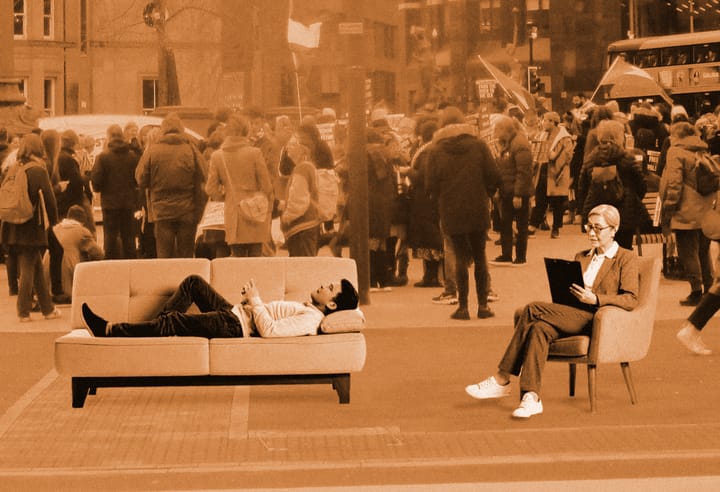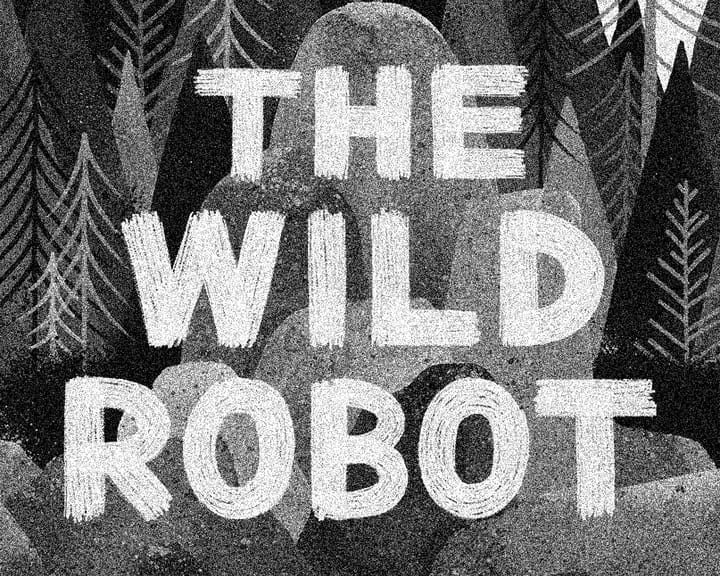Tomorrow Never Comes
It's easier to imagine the end of the world than the end of class.

Against the possibility of total socio-ecological collapse, it seems almost comical to consider what individual measures a person can take to “prepare” for it. Social calamity requires social response, but within the current context of neoliberalism, we assume that we can only rely on ourselves. All risks should be individually assessed and proper precautions are the responsibility of the individual. The anxiety of collapse, at its core, is an anxiety of knowing individual measures will not matter.
However, in the barren political imagination of neoliberalism, consuming commodities is the only recourse, and a market emerges to fill those manufactured needs, however ineffective. Some religious sects may be getting ready for the rapture. Unfathomably wealthy people may be buying islands. The Los Angeles-based start-up Preppi is helping the middle class join in the action by fusing the existential fear of apocalyptic collapse with anxiety about losing class status.
Preppi sells a posh version of what might otherwise be considered a bug out bag: a backpack that has some number of days of daily necessities in the event of an emergency. What distinguishes it from other bug out bags is its aestheticization of preparedness as well as its carefully curated contents. As Preppi points out, the bags are designed for display in your home, “not stashed deep in a closet or garage.”
Besides the basics of food water and first aid, one finds inessential content like boutique brands of chocolate, toiletries, and tea. Preppi seeks to take the anxiety out of imagining the end of civilization: “…we hope to make emergency preparedness less daunting and maybe even a little fun.” The official Preppi Instagram account doubles down on mixing disaster with pleasure. Its posts contain images of aspirational travel locations, endorsements from middle-class approved celebrities like Meryl Streep and Gwyneth Paltrow, and stills of natural disasters from around the world. Hashtags on photographs of Preppi bag contents include, #earthquake #california #losangeles #sanfrancisco #japan #bestearthquakekit #hurricane #tornado #tsunami #emergencypreparedness #hamptons #monogram #bestweddinggift—essentially a list of locations with a history of destructive natural disasters. The actual death, loss, and terror associated with these events are turned into searchable marketing phrases.
The lesson: sartorial identity will survive disaster.
There is a clear disconnect between the magnitude of civilizational collapse and the commodities in a Preppi bag. Nothing in these tastefully curated bags and boxes would do much for actual survival. It makes little sense, then, to speak of Preppi as though it is actually soothing anybody’s existential dread about the end of the world. What then is the anxiety Preppi assuages?
The kit addresses the feared loss of class status for those in the middle. The super rich have elaborate plans to escape certain death. They purchase property in secretive locations, have helicopters at the ready, and even secure the possibility of purchasing citizenship—moves available only to people in the Peter Thiel-class of wealth. The poor are left to fend for themselves in the wreckage; a new marking of their class is the inability to flee or comfortably hunker down. The Preppi bag is marketed to people not wealthy enough to buy an island who nevertheless wish to distinguish themselves from the rabble.
Whether a Preppi kit would be effective in a crisis is beside the point. What you are buying is a cheap promise of continued middle-class existence. The dread of economic precarity is displaced onto the end of the world itself. In this way, the prepping market presents an anticlimactic apocalypse. The assumption is that no disaster will be so complete that one would not have time to enjoy luxury products while waiting for rescue.
What makes this anticlimactic apocalypse especially galling is the fact that there are good reasons to worry about the future prospects for human life on this planet. Accelerating climate change and destabilized geopolitics should engender a collective existential anxiety and mobilize a collective political response. Because this would require a shift of power from elites, we are instead encouraged to seek survival through our respective class means as individuals.
Erik Swyngedouw argues that economic and environmental disaster narratives have concerning implications: “While the ecological Armageddon points at a universal, potentially species-wide destruction, the economic catastrophe is a particular one related solely to the threatened reproduction of, basically, capitalist relations.” For the middle and upper classes, disaster is not just the loss of one’s property: it is the loss of a system that produces their socio-economic class and access to a society organized around the demonstration of one’s standing in the class hierarchy. Surviving economic and/or environmental disaster is dependent upon the survival of the political and economic conditions that more than likely contributed to the disaster. As Swyngedouw points out, hoping for the endurance of life as we knew it prior to catastrophic change is a hope for the maintenance of neoliberal capitalism.
The anxiety that drives one to buy a Preppi kit is beyond the fear of the next big earthquake; it’s a deep, existential fear of loss of identity bound up with class distinction. Buying a Preppi kit is a way to buy assurance that the post-catastrophe future will not be a post-capitalist one. The contents and design of the Preppi will still possess the desired socio-economic markers, even after the foundations have stopped shaking.
Examining the Preppi bag allows a glimpse into the anxiety-producing conditions of late capitalism and its sibling, climate change. Both produce uneasiness about the stability of life as we know it, and as both intensify, they increasingly foreclose opportunities for avoiding disaster. Preppi is but one outlet of many for consuming one’s way to a sense of safety and predictability. It gives the impression that the political and economic framework in which we live, produce, and consume will be left standing, regardless of what comes.
■
Penny Bun dresses for the disaster she wants, not the disaster she has.
Otfried Preußler is haunted by the ghost of Mancur Olson, among others.



